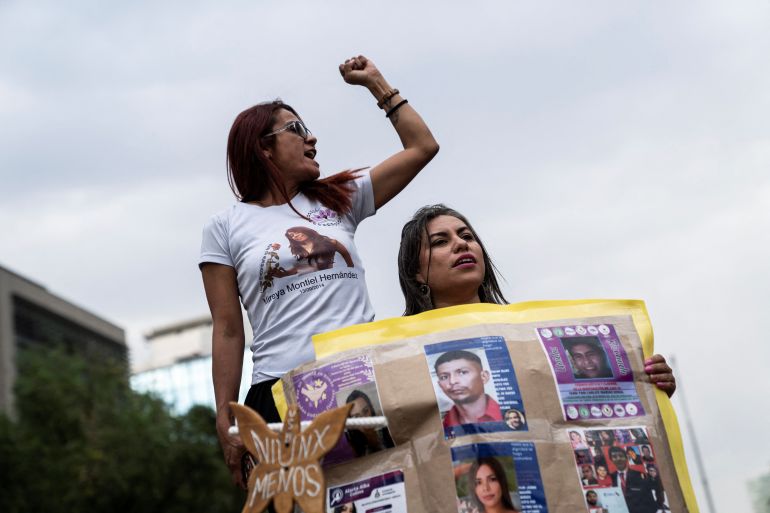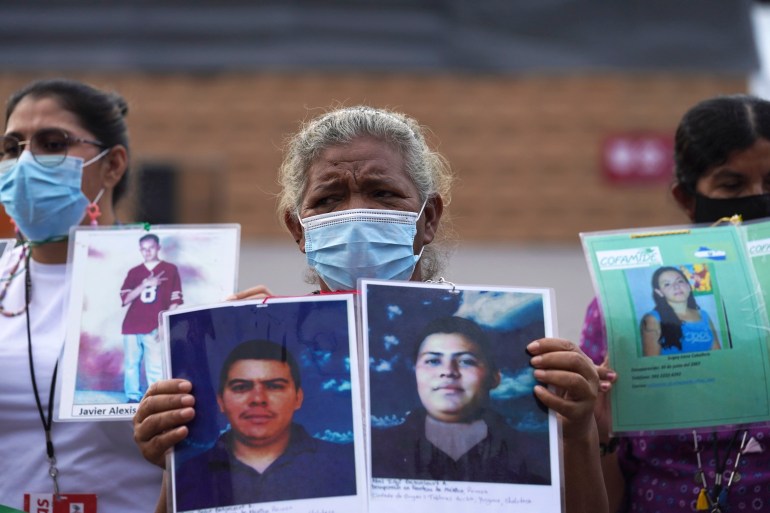Mexico: Women march to demand justice, answers for disappeared
Thousands take to the streets of Mexico City amid a worsening wave of violence and enforced disappearances nationwide.

Thousands of women in Mexico have spent Mother’s Day marching in the nation’s sprawling capital, chanting and carrying pictures of their missing relatives, to demand accountability amid a worsening surge in violence.
“Where are they, where are they? Our children, where are they?” the women shouted on Tuesday as they demonstrated with supporters along Mexico City’s main avenue under the banner, “March for National Dignity”.
Keep reading
list of 3 itemsBiden talks with Mexico’s AMLO to discuss migration, Ukraine
Why is femicide in Mexico on the rise?
Protesters blocked traffic while pumping their fists and chanting, “What do we want? Justice! When do we want it? Now!”
According to the United Nations, more than 95,000 people in Mexico were officially registered as disappeared as of November 26, 2021, while the National Register of Disappeared Persons says 8,000 new cases were reported annually over the past five years.
Relatives of Mexico’s disappeared march every year, but this year, they were joined by a caravan of Central American mothers searching for loved ones who went missing while on their journey to the United States.
Their protest began in the southern Mexican city of Tapachula, often the first city migrants reach on their way north.

Precise figures on the violence migrants face in Mexico are difficult to come by, but rights groups monitoring towns along the US-Mexico border say they are exposed to kidnapping, torture, rape and other violent attacks.
Araceli Hernandez, 50, from the Mexican city of Guadalajara, has photos of her daughter Vanessa and son Manuel, in their 20s, on an altar in her home. She has not heard from them since 2017, when first Vanessa disappeared. Her brother disappeared while searching for her.
“They had been missing for about four months when I grabbed a backpack, some bottles of water, a wooden stick and started walking in the hills,” Hernandez told the AFP news agency.
She joined the growing number of mothers who have formed nationwide associations that comb the countryside for clandestine graves that might hold their children’s remains.
“It’s my mission as a mother,” she said.
Disappearances began during the Mexican authorities’ so-called dirty war against revolutionary movements of the 1960s to 1980s.
More recently, disappearances and homicides have soared amid a nationwide push to crack down on drug cartels and organised criminal groups in the country. Since 2006, more than 340,000 people have been murdered in a spiral of worsening violence.
According to the government, there are around 37,000 unidentified corpses lying unclaimed in forensic services, though activists believe the number is higher than 50,000.
The violence and disappearances disproportionately affect women and girls. In Mexico, an average of 10 women a day are killed, and tens of thousands more go missing.
Last month, the disappearance of Debanhi Escobar, an 18-year-old law student, sparked fresh outrage amid a spate of disappearances of women in Nuevo Leon’s capital, Monterrey.
Her body was found two weeks later submerged in a cistern inside the grounds of a motel near where she was last seen alive, according to authorities. Hundreds of women blocked a highway in downtown Monterrey in the days following, demanding an end to gender violence.
Twenty-six women and girls have disappeared in Nuevo Leon this year, and five more have been found dead after being reported missing.
Last month, the United Nations Committee on Enforced Disappearances urged Mexico to tackle “the alarming trend of rising enforced disappearances”, saying the problem is facilitated by “almost absolute impunity”.
“Organized crime has become a central perpetrator of disappearance in Mexico, with varying degrees of participation, acquiescence or omission by public servants,” the Committee said in a report after a delegation visited Mexico in November of last year.
The report found that less than 6 percent of disappearances had resulted in prosecutions.
“Impunity in Mexico is a structural feature that favours the reproduction and cover-up of enforced disappearances and creates threats and anxiety to the victims, those defending and promoting their rights, public servants searching for the disappeared and investigating their cases, and society as a whole,” the committee said.
¡#10DeMayo no es de fiesta, es de lucha y de protesta!✊
Hoy salimos a las calles y levantamos nuestras voces por nuestrxs seres queridos desaparecidos. 🙌En un México con más de #100MilDesaparecidos hoy pedimos ¡#NoMásDesapariciones!📣 pic.twitter.com/34g4gAEZoO
— @movNDmx (@movNDmx) May 10, 2022
Translation: It is not a party, it is a fight and a protest! Today we take to the streets and raise our voices for our missing loved ones. In a Mexico with more than 100,000 missing today we ask for no more disappearances!
In 2014, 43 teaching students went missing after they were detained by local police in Iguala in the southern state of Guerrero while they were on their way to a protest.
Most of their bodies have never been found, and experts with the Inter-American Commission on Human Rights found that investigators, prosecutors, and military personnel had altered crime scenes and records.
On Tuesday, Mexico’s President Andres Manuel Lopez Obrador, who campaigned on a promise to tackle the nation’s soaring crime rates but has struggled to achieve that goal since taking office in 2018, alluded to the Mother’s Day march.
“Many congratulations to all [mothers], to those who are suffering for their children, for their disappeared, to those who are sick or are worried about their sick relatives, the humble, poor women of all the communities, towns, to the working women, to the all women, all mothers,” Lopez Obrador said during his daily morning news briefing.